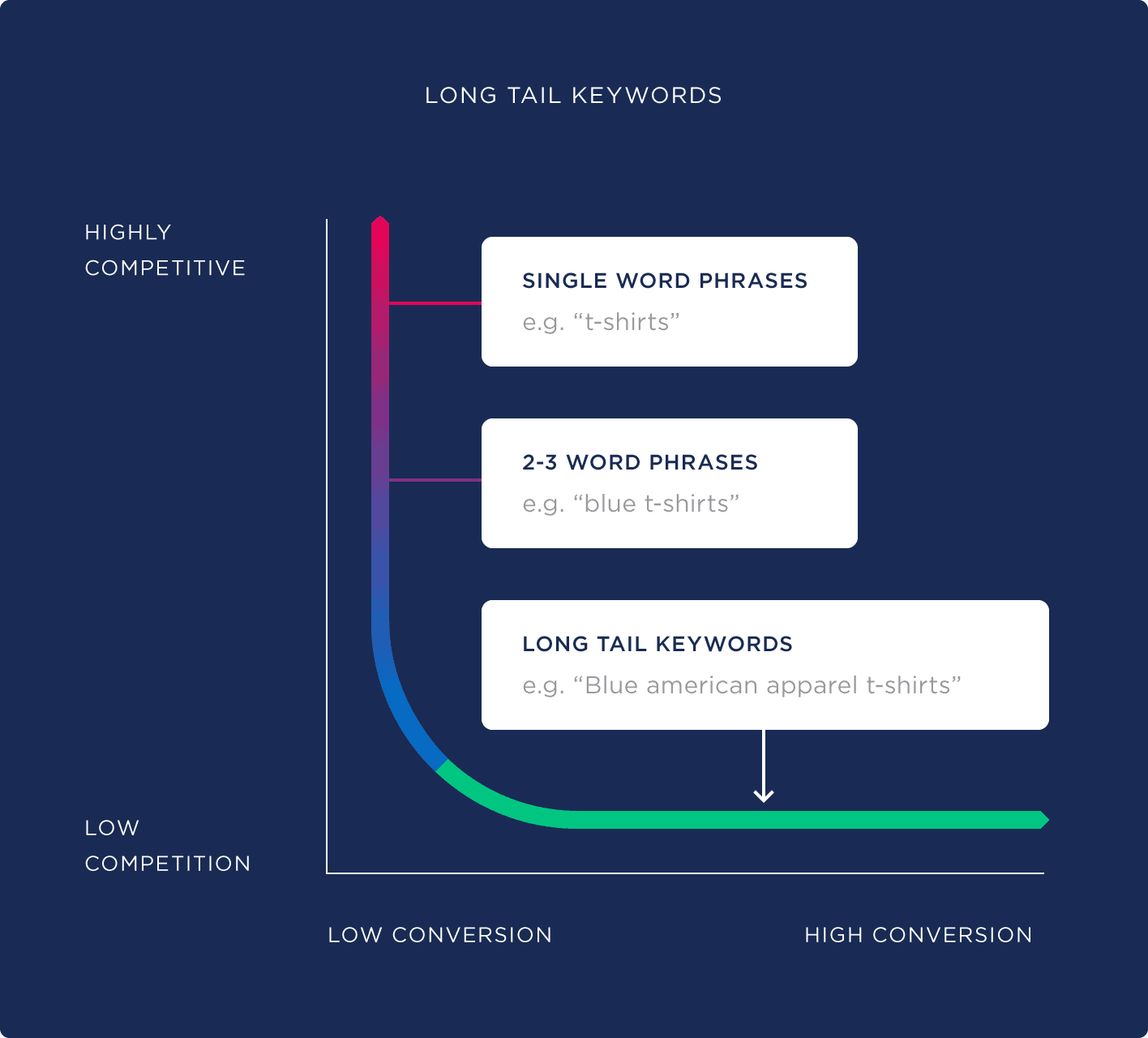How to use long-tail keywords to drive traffic to your blog? Is the investment of your time and effort into harnessing long-tail keywords truly worthwhile for driving traffic to your blog? The unequivocal answer is yes. Some might argue against the efficacy of this strategy, but within this article, we shall unveil the secrets of wielding long-tail keywords effectively.
Contrary to the expectations of the masses, the deployment of long-tail keywords may indeed yield only a modest daily influx of visitors to your blog. However, the naysayers are not mistaken in this regard.
Long-tail keywords are phrases or expressions that prospective customers employ when seeking products that are further down the purchase funnel, generating specialized search outcomes. Though they may seem intricate at first glance, when mastered, they hold immense potential for bolstering your website’s search engine rankings.
Effectively harnessing long-tail keywords necessitates a dedicated effort to engage both existing and potential clientele. The more precise your choice of keywords, the more precisely your target market is delineated. Consequently, while adopting a long-term approach may result in fewer visits, the audience you attract is bound to be more dedicated and exhibit greater potential for conversions.
Perhaps you didn’t anticipate this revelation. A long-tail keyword, as elucidated, may yield a smaller quantity of traffic, but it will be exceptionally targeted traffic. These are individuals who are inclined to linger, explore additional posts, subscribe to your RSS feed or mailing list, and potentially contribute to your blog’s revenue stream. How AI, ChatGPT maximizes the earnings of many people in minutes.
Defining Long-Tail Keywords
Long-tail keywords typically endure less frequent searches. They are characteristically composed of three or more words. In most instances, long-tail keywords are more amenable to attaining higher rankings compared to head keywords. However, this pursuit demands a greater investment of time, effort, and unwavering consistency.
The long tail typically constitutes a variation of a prevalent, broad keyword or phrase. This keyword, along with other synonymous or pertinent terms, is often combined or supplemented. Despite representing a minor share of total search traffic, these phrases frequently generate a substantial volume of high-converting traffic, marking them as highly efficacious.
How to use long-tail keywords and boost traffic to your blog?
Unlocking the potential of long-tail keywords is a straightforward process that unfolds across three key steps:
Keyword Selection
Commence by utilizing your preferred keyword tool, such as Google’s Keyword Planner. Seek a term that closely aligns with your core keyword yet faces less competitive pressure. Think of it as identifying an off-the-beaten-path term that still commands a dedicated user base. Business – Money Making – Marketing – Ecommerce.
Seamless Integration
As you embark on crafting your article, ensure that the chosen long-tail keyword seamlessly integrates into your title and flows organically throughout the body of your content. Strive to maintain topical relevance and deliver on the promise inherent in your post’s title. Above all, avoid the perils of keyword stuffing, as excessive use may incur the displeasure of search engines.
Leveraging Article Directories
Enhance your content’s reach by submitting your article to select article directories. This savvy tactic not only repurposes your content but also garners valuable backlinks. Assure compliance with the directories’ editorial standards, and you’ll encounter no impediments to acceptance.
It’s essential to emphasize that you can republish your original content elsewhere, steering clear of duplication. Syndicating your content is a permissible endeavor, provided it is executed diligently. When executed correctly, you can elude the dreaded duplicate content penalty. Grow Your Skills and Employability with Certifications.

Surpassing the Competition
The utilization of long-tail keywords bestows upon you the ability to surpass your competition. These keywords hold more sway than their broader counterparts, positioning you favorably in search results. The greater frequency with which you incorporate these lower-value yet less competitive keywords enhances your prospects of outpacing competitors and elevating your website traffic. Create a stunning Portfolio Website with ready-for-your templates.
For instance, consider the search landscape: nearly 40,000 Google queries for “augmented reality for the PlayStation 4” have been recorded. In contrast, “virtual goggles” has garnered only a few thousand inquiries, while “virtual glasses” languishes with less than ten. These disparities in Search Engine Optimization Difficulty, abbreviated as SD, range from one to one hundred, with one signifying the simplest and one hundred the most arduous. The strategic deployment of high-volume, low-competition keywords augments conversion rates.
Embarking on Long-Tail Keyword Research
Embarking on an odyssey of long-tail keyword research necessitates a comprehensive understanding of your Unique Selling Proposition (USP) and the unique capabilities and aspirations of your customer base and audience. Delving into their needs mandates diligent research to ascertain if the keywords you employ align with the search queries they employ.
Keyword research unfurls the veil on similar keywords wielded by your competitors, providing valuable insights. Synchronizing your team’s knowledge with emerging research, analytics, and data ensures cohesion and alignment. Cheap but Good Hosting services Rated by Reviewers.
Long-Tail Keywords in User Search Habits
At the core of Google’s mission lies the imperative to furnish users with the most pertinent search results. Users seek to acquire new knowledge, unearth novel discoveries, or explore uncharted territories. It is pivotal, therefore, to integrate keywords germane to your marketing strategy to cater to these user preferences.
Deciphering Audience Needs and Desires
A comprehension of your target audience’s needs and desires is a crucial precursor to progress. It entails comprehending what additional information they yearn for and recognizing the factors that weigh upon their decision to embrace or eschew your offerings. Investing in SEO software aids in pinpointing the most judicious keywords to incorporate. Trusted VPN Services to Secure Your Business.
Unveiling Your Unique Selling Proposition (USP)
Before proceeding, introspect on your business’s viability concerning your selected keywords. What sets your product or service apart in a sea of competition? Whom do you intend to serve? What convinces them that you offer a superior alternative to rival entities?
Attracting Qualified Searchers via Long-Tail Keywords
In instances of limited exact keywords to contend for, competition intensifies, but lower rankings equate to diminished visitor numbers. Strategic placement of long-tail keywords, however, enables you to draw high-caliber visitors while minimizing overall search volume.
This approach augments your Return on Investment (ROI), as you not only draw the specific audience you seek but also enhance their proximity to conversion compared to less-targeted competitors.
Reduced Competition Translating to Lower Costs
Long-tail keywords bear significance not only for organic searches but also for paid advertising endeavors. Engaging in bidding for long-tail keywords yields reduced competition, culminating in fundamentally lower Costs Per Click (CPC).
Through the pursuit of lengthier, more precise keywords, you can secure elevated ad rankings and diminish the cost incurred per ad click. 15 Amazingly Cheap and Reliable AI Content Writers.
Final thought
The realm of keyword strategies should embrace long-tail keywords, which are often neglected in favor of their head keyword counterparts. In the fast-evolving landscape of business, companies must adeptly employ various marketing tactics and leverage emerging technologies like cloud-based solutions, artificial intelligence, and intelligent email marketing. Amidst these dynamic changes, however, lies a paramount factor: effective keyword strategies. Premium Templates for Business, eCommerce, Professional, or Personal Websites.
Strategic keyword research serves as the cornerstone of all digital marketing endeavors. It is the gateway through which your online presence is established and brand recognition and longevity are nurtured. Undeniably, the significance of strategic keyword research in SEO cannot be overstated. It underpins your entire content marketing strategy, enticing your target audience to delve deeper or convert. Long-tail keywords should thus assume a prominent role within your campaigns, fortifying your digital marketing blueprint with resilience and longevity. We design and develop e-commerce, freelance, business, and personal websites from scratch.
